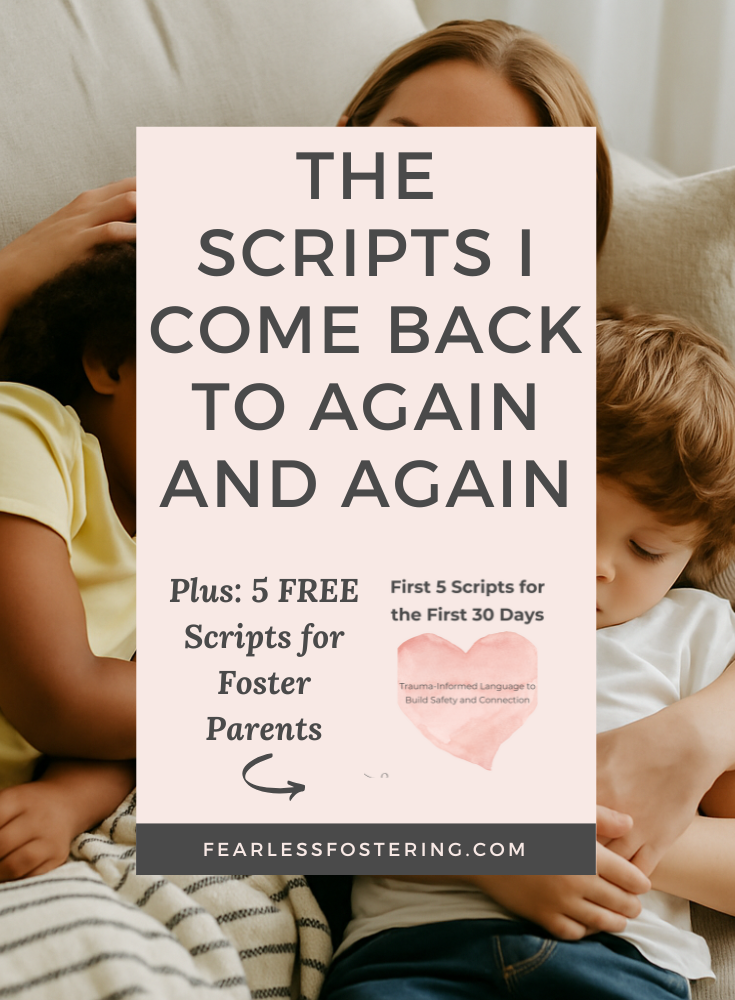
When you’re parenting through trauma, the words you say matter. I learned that the hard way.
In my early days of fostering, I found myself overwhelmed—not just by the logistics or the behaviors, but by the moments I had no words for. A meltdown. A silence that screamed. A goodbye I wasn’t ready for.
I’d freeze. I’d say something that didn’t land right. Or I’d just go quiet.
Over the years, I started collecting phrases—scripts—that helped. Words that regulated me and connected with the child in front of me. Words that reminded me I wasn’t alone, and neither were they.
Today, I’m sharing the scripts I come back to again and again. They’re not magic. But they’ve helped me stay present, stay grounded, and show up with compassion—especially when everything felt like it was falling apart.
1. “You’re safe. I’m here. We’ll figure this out together.”
I’ve used this phrase more times than I can count. It’s simple. It’s grounding. And it meets the moment without trying to fix it too quickly.
Kids who’ve experienced trauma often wait for the other shoe to drop. They expect abandonment, anger, or indifference. Saying “You’re safe” is a way of offering stability. Saying “I’m here” is a promise. And “We’ll figure this out together” is a reminder they don’t have to carry it all alone.
2. “It makes sense that you feel that way.”
Validation is a powerful form of connection. Early on, I used to jump into problem-solving or redirection. Now, I pause and try to reflect what I see and hear.
When a child says, “I hate this place,” or “I don’t want to go to that visit,” I don’t correct or convince. I say, “It makes sense that you feel that way.” It doesn’t mean I agree with every behavior or belief—but it means I understand why they’re feeling what they’re feeling. And that opens the door to connection.
3. “You don’t have to talk about it, but I’m here if you want to.”
Silence used to scare me. I’d want to ask more questions or “get to the bottom” of whatever was going on. But silence can be a trauma response too—and rushing it never helps.
This phrase gives space without pressure. It tells the child that I’m available, emotionally safe, and not going anywhere. And sometimes, just knowing that is enough.
4. “This is hard, and we can do hard things.”
I need this one for myself as much as I say it to my kids. Fostering is hard. Parenting through grief, visits, transitions, and uncertainty is hard. But we can do hard things—together.
I say this out loud during tough moments, and over time, I’ve heard kids say it back to themselves. That’s the power of modeling. That’s the power of a script becoming a belief.
5. “I’m still learning too.”
There is so much pressure to be the calm, perfect, always-knowing adult. But the truth is—we’re still learning too. This phrase disarms shame. It gives permission to grow. And it reminds both of us that progress is allowed to be messy.
When I lose my temper, or I realize I misunderstood a behavior, I circle back. I apologize. And I say, “I’m still learning too.” That vulnerability builds trust—and it lets the child know they don’t have to be perfect either.
Why Scripts Work
Trauma affects the brain, body, and ability to feel safe in relationship. Scripts work not because they’re magic words—but because they’re grounding. Predictable. Regulating. And they show the child that you are regulated too.
When you use a script consistently, it becomes an anchor. The child begins to associate your tone, your words, and your presence with safety. And that’s where healing begins.
Scripts Aren’t Just for Kids
They’re for you, too.
There have been moments when I’ve whispered, “I’m still learning too,” to myself in the car after a hard day. When I’ve said, “You’re safe” just as much for me as for the child beside me.
Scripts are a bridge between the emotional chaos and the calm we all need.
Where to Start
If you’re looking for trauma-informed phrases to use in your foster parenting journey, I created a free guide called the First 5 Scripts for Foster Parents. It includes the phrases above, plus tips on how and when to use them.
And if you’re ready to go deeper, the First 30 Days Foster Parent Toolkit includes trauma-informed resources, scripts, routines, and printables to support you through the hardest parts of foster care. It’s the resource I wish I had in my first month.
You can learn more about it here.
You don’t have to have all the answers.
You just need the tools to show up with compassion, regulation, and connection—even when things are messy.
These scripts help me do that.
And now they’re here for you, too.
With you in it,
Cathleen
+ show Comments
- Hide Comments
add a comment